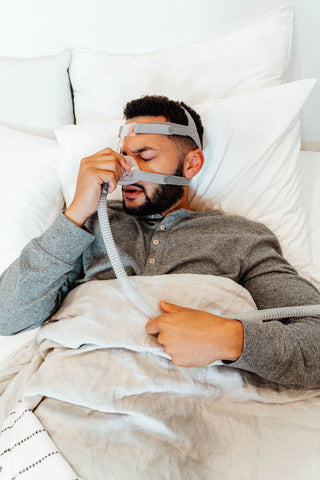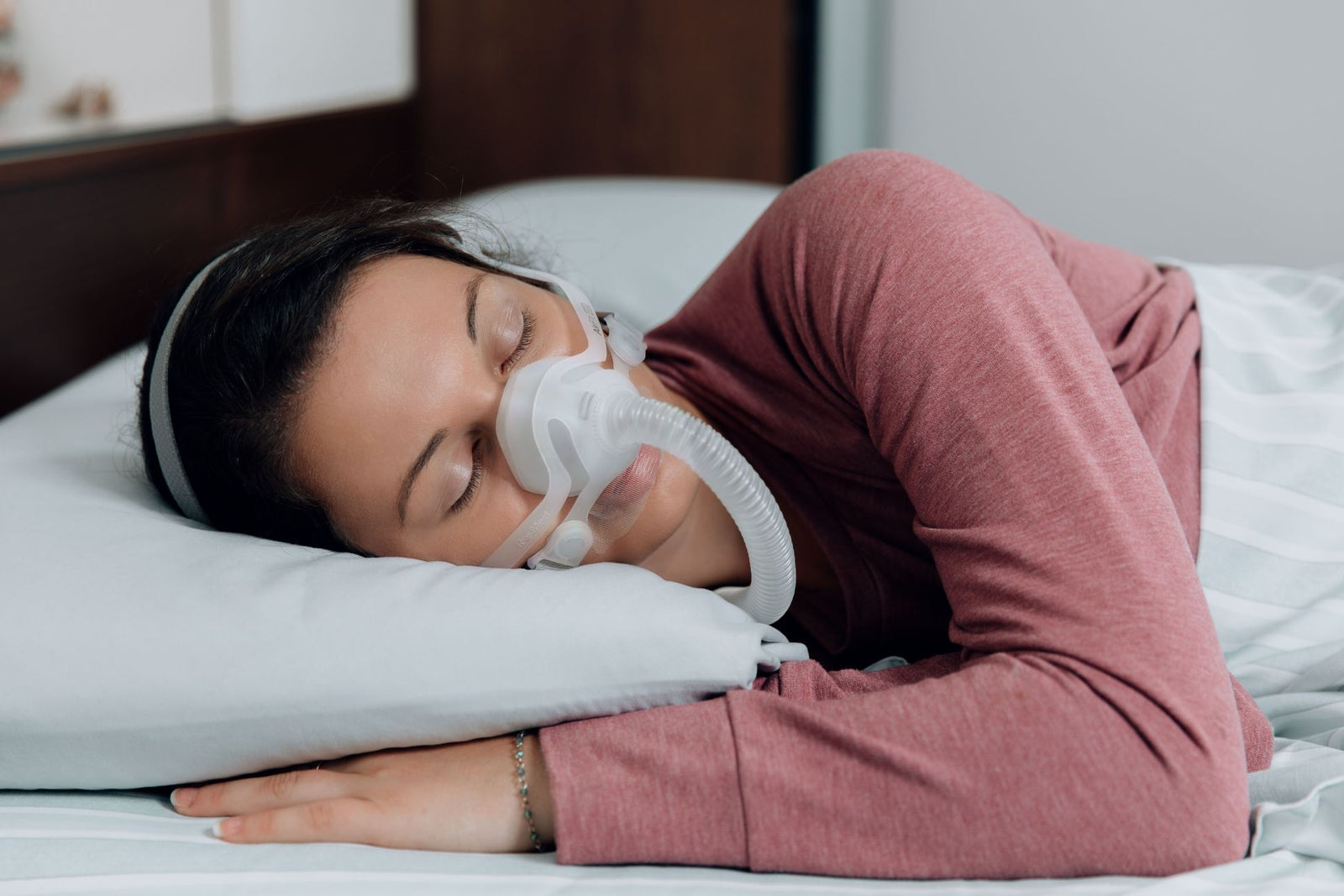If you suffer from sleep apnea, you might think that clunky, intrusive headgear and a disruptive night’s sleep are problems you just have to learn how to live with.
Many sleep apnea sufferers ultimately cut back on treatment because of the cumbersome equipment associated with CPAP therapy. Studies show that as many as 50 percent of patients stop using their machines altogether.

What if something as simple as a piece of tape could change all of that? It actually can. Turns out, mouth taping for sleep apnea can take your nights from restless to restful.
Before we dive into the logistics, we must first understand how the airway becomes blocked during sleep in the first place.
How Mouth Breathing Leads to Blocked Airways
Weak jaw muscles and habitual mouth breathing during the day can lead to open mouth breathing during sleep. As a result, the airway becomes more narrow than usual.
Airway tissues then fall back into the airway, since gravity pulls everything downward while you’re lying down. These tissues sometimes vibrate due to the narrowed space, leading to snoring and sleep apnea.

A continuous positive airway pressure (CPAP) machine works to combat this problem. A CPAP machine pumps air into the airway, helping to widen it and keep the tissues clear from creating any blockages that interfere with breathing and sleep quality.
But mouth breathing is still possible with a CPAP machine. And not only does it diminish the quality of your CPAP therapy, but it can also cause some concerning health issues.
How Mouth Breathing Harms Health
We breathe automatically without even thinking about it. However, giving your breath a second thought might be worth the trouble in the name of protecting and improving your health.
The most efficient way to breathe? Through the nose. The mouth should only be used as a secondary method of breathing. For example, your mouth comes in handy and acts as a “backup” during cases of severe congestion.
First and foremost, your mouth exists to allow you to talk, taste, and eat. The nose, on the other hand, is designed to smell, humidify the air, filter the air, and deliver the breath optimally to the lungs.

When you breathe through the mouth, the air remains dry and unfiltered. A larger volume of air is pushed through the airway than is ideal, which leads to airway collapse and sleep apnea at night.
Mouth breathing also causes the following problems in the body:
- Increased blood pressure
- Increased heart rate
- Poor oral health, including cavities and gum disease
- Headaches
- Brain fog
- Increased risk for continued nasal congestion
- Dry mouth and sore throat
- Decreased immunity
- Chronic inflammation
- Bad breath (halitosis)
- Jaw pain and tension
Moreover, blood oxygen and CO2 levels drop during mouth breathing. This causes a “fight or flight” reaction in the body since it activates the sympathetic nervous system.
As a result, adrenaline pulses through the body at a rapid rate and levels of the stress hormone cortisol rise. This increase in adrenaline can cause disruptions in your sleep during the night.
Luckily, the nose can help us avoid this issue.
Why Nasal Breathing is Best
While mouth breathing activates the body’s stress response, nasal breathing does the opposite. Nasal breathing produces nitric oxide, a spectacular molecule that dilates the blood vessels, increases blood flow, and improves blood pressure.
@somnifix Sarah Hornsby, #myofunctionaltherapist, talks #nitricoxcide and #nasalbreathing 👃 #airwayhealth #biohacking via #youtube
♬ Touch Down 2 Cause Hell - Hd4president
Nasal breathing activates the parasympathetic nervous system, responsible for our “rest and digest” response.
This leads to:
- Improved memory
- Boosted sleep quality
- Improved digestion
- Pain relief
- Decreased inflammation
- Improved mental health
- Boosted immunity
There’s just one problem: you may not be nasal breathing throughout the night, even with a CPAP mask. Luckily, mouth taping helps sleep apnea sufferers maintain nasal breathing all night long.
How Mouth Taping Helps Sleep Apnea Sufferers
The quickest way to render your CPAP therapy less effective? Mouth breathing. A full-face mask may reduce the chances of mouth breathing, but this cumbersome option isn’t for everyone.
A nasal mask or nasal pillow offers CPAP therapy with comfort in mind. But if your mouth falls open, you’ve got a problem. You may even wake up repeatedly throughout the night due to low compliance and complications caused by mouth breathing.
Your doctor may suggest a chin strap to combat the mouth breathing, but this solution doesn’t always help. You can still mouth breathe with a chin strap on since your lips aren’t sealed. Who wants to wear uncomfortable equipment if it doesn’t solve the problem?

Mouth taping for sleep apnea can help. Wearing mouth tape at night in combination with your full-face mask, nasal mask, or nasal pillow ensures that you stay comfortable while receiving the successful CPAP therapy you need for a solid night’s rest.
Mouth tape creates a strong lip seal, which means that mouth breathing won’t even be on your radar. The lip seal leads to nasal breathing, which prevents the tongue from falling back into the airway.

SomniFix Mouth Strips allow you to tape your mouth in seconds, all while protecting your skin.
SomniFix + Your CPAP Mask = The Perfect Pairing
Mouth taping for sleep apnea sounds outlandish, but it can help you finally feel well-rested (and protect your health from the dangers of mouth breathing).
But any old tape won’t do. In fact, some tape can irritate the skin, leading to rashes, irritation, and chapped lips.
In other words, you definitely want to avoid slapping some duct tape over your mouth. Micropore tape is one option, but it isn’t always suited for those with sensitive skin.
Like a tasty cheese to the perfect wine, SomniFix is the perfect addition to your CPAP mask. You’ll be able to wear a comfortable mask without having to worry about mouth breathing throughout the night.

Our strips are non-irritating thanks to the latex-free and gluten-free material. The gel-like adhesive is hypoallergenic and includes a small breathing vent that can be used to breathe through the mouth in an emergency, such as severe congestion.
Ditch your bulky mask and ineffective chin strap for good and tape your way to a great night’s rest instead!



